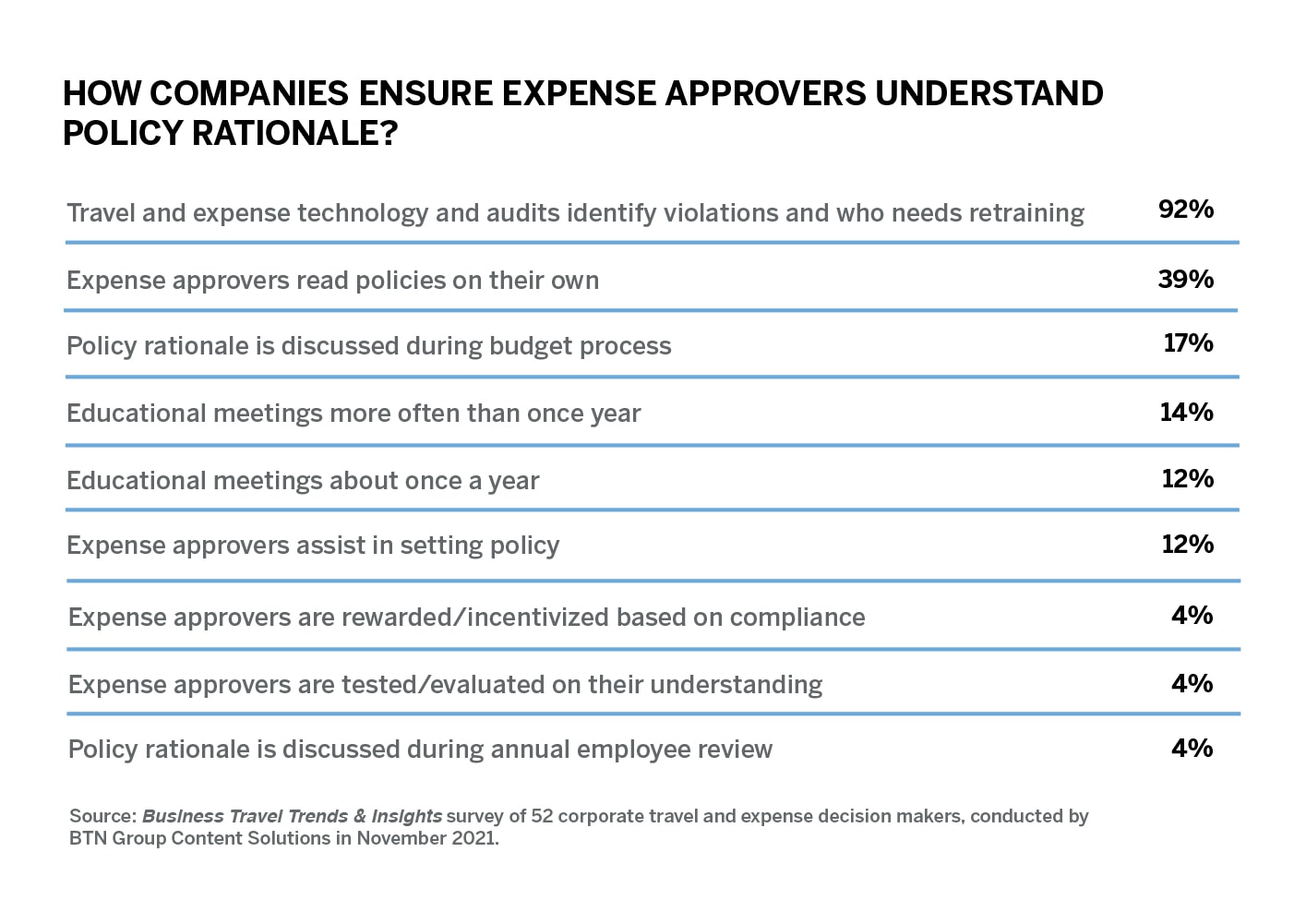Employee understanding of travel and expense policy rationale relies on one thing: proper management. Whether it’s a business or finance manager who approves expense reports, it’s important they understand the reasoning behind the rules they are responsible for enforcing. Travel managers admit there is room for improvement here: When asked how well they felt their organization conveys travel and expense policies to employees, 56% of travel managers said OK, but admitted their company could do even better, according to Business Travel Trends & Insights survey conducted by BTN Group Content Solutions in November 2021. One-quarter admitted they do a poor job, and that communication needs an overhaul. Perhaps that overhaul starts with them.
Based on those survey results, there are three simple steps to ensuring business and finance managers are up to the task.
Managers Should be Accountable and Rewarded
Business managers should be held accountable for their travelers’ compliance; when violations are found, they need to fix it. But many corporations do not have systems in place to ensure managers are even educated on policy. According to the Business Travel Trends & Insights survey, only 4% of expense approvers are tested/evaluated on their understanding of policy. For those who consistently do the right thing, there are few accolades. Only a handful of travel managers (4%) said they are rewarded/incentivized based on compliance of their team. Recognizing business managers who have successfully communicated program guidelines will give them, and their employees, more confidence in the program overall.
Don’t Rely Solely on Automation
Busy managers depend on automated processes to stay informed, but there can be too much reliance on technology versus personal communication with employees. Nine out of 10 travel managers in the Business Travel Trends & Insights survey said they rely on travel and expense technology and audits to identify violations and those who may need retraining. But automation only goes so far in ensuring messaging gets through. Though expense systems are configured to alert employees of violations, 42% of respondents said managers are responsible for educating travelers about travel and expense policy. Managers should explain to travelers what violations mean to the program, departmental budgets and how they may affect the company’s overall travel strategy. To do this properly requires training and retraining of all as policies shift.
Train Managers Frequently
With so many other priorities swirling in their heads, business managers need consistent reminders of the travel and expense policies in place. Four out of 10 travel managers said policies are sent to expense approvers to read on their own. Fewer than one-fifth discuss policy rationale during the budget process, and even fewer attend educational meetings. It would help if managers were more involved from the start, but only 12% of travel managers said that expense approvers assist in setting policy in the first place. Without their buy-in, it is more difficult to engrain the program’s value to employees.

Time for a Refresh
The inevitable increase in travel means it’s even more critical for managers to be educated on expense policies and compliance rates – and to do it more often. Since many employees haven’t traveled in a while, there’s a good chance everyone is rusty on guidelines, changes, and rationale, and can use a refresh. These reminders could include anything from preferred supplier usage, approved destinations, accepted fare classes and travel budget adjustments. Auditing travel policy compliance – using artificial intelligence and machine learning – will help travel managers fully understand where communications need improvement and policies need change. When violations do occur, managers can more readily identify areas for improvement rather than placing blame.
Half of travel managers said they need to retrain all employees about the new realities of business travel. And three-quarters agreed with the statement: “Our travelers will need to be retrained on policy, practices and safety once travel resumes.” Three of five managers said they communicate policy to their employees about once a year, or during onboarding. Notifying both employees and managers of changes, and reviewing existing policy, should happen at least twice a year.
To maintain or improve compliance to travel programs, travel and expense managers should be just as educated about policy and process as are their employees. They should be trained on the online tools used by the company and be prepared to answer any questions that may arise. They should have full visibility into their employees’ behavior and compliance. Whether it’s through webinars, videos, or messages from top management, keeping travel and expense managers well informed should be prioritized to ensure buy-in at all levels.



